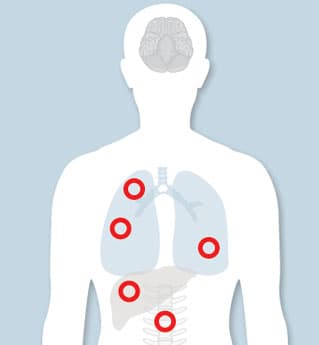Ovarian Cancer Diagnosis and Treatment
Ovarian cancer is rare — just 12 out of every 100,000 women are diagnosed with the disease each year. While the median age is 63, young women also can be affected, especially if they have an inherited susceptibility to develop cancer or if they develop a borderline tumor.
The term ovarian cancer applies to three related cancers based on the probable site of origin: fallopian tube, peritoneal (the lining of the abdominal cavity) and ovary.
Ovarian Cancer Symptoms
The signs and symptoms of ovarian cancer are subtle and nonspecific. In many cases, symptoms go unnoticed until the disease has spread.
Symptoms may include:
- Bladder pressure, frequent urination
- Difficulty eating; feeling full
- Fatigue
- Gas, bloating or bowel changes that include constipation and diarrhea
- Persistent pelvic, abdominal or back pain
- Swelling in the abdomen
- Weight loss
- Leg swelling
If you have symptoms of ovarian cancer, experts at UChicago Medicine can help.
Find an Ovarian Cancer Specialist
Ovarian Cancer Diagnosis Process
In addition to taking your medical and family history, our team uses a combination of tests to diagnose ovarian cancer. Some tests you may have include:
- Pelvic exam: During this exam, your provider will insert a finger inside your vagina and press down gently on your abdomen to feel your ovaries.
- Transvaginal ultrasound: This imaging procedure uses sound waves to detect tumors in the ovaries. During this procedure, your provider will insert a long, thin ultrasound wand into your vagina.
- Blood tests: These tests can check for high levels of tumor markers like CA-125, a protein associated with ovarian cancer.
- Genetic testing: These blood or saliva tests check for mutations in the BRCA1 and BRCA2 genes, which are linked to hereditary ovarian and breast cancer.
-
Biopsy: A biopsy is the only test that can confirm you have ovarian cancer.
Our pathologists — nationally known experts in gynecologic pathology — examine biopsied tumor cells under high-resolution microscopes to determine the correct diagnosis, which will then guide treatment. Different types of biopsies include:
- Surgical biopsy, in which a surgeon takes a sample of the tumor during minimally invasive or traditional (open) surgery. This type of biopsy is also used to stage cancer. It may be performed at the same time as treatment to “debulk” an ovarian tumor.
- Needle biopsy, in which an interventional radiologist removes tissue from a tumor using a needle and image guidance, such as an ultrasound. This type of biopsy is less common than surgical biopsy for ovarian tumors.
Advanced Imaging
After an ovarian cancer diagnosis, additional imaging tests may be recommended to determine spread of the disease. Advanced capabilities at UChicago Medicine include:
Analyzes how water molecules move in tissues to detect tumors.
Uses X-rays to create 3D pictures of the body.
Uses magnetic fields to create detailed pictures of your internal organs.
Uses a radioactive drug to evaluate how specific organs are functioning in the body.
May be used to conduct image-directed biopsies and assess cancer spread.
Expert radiologists with extensive experience in reading these imaging studies meet with the gynecologic oncology team at our weekly multidisciplinary tumor board conference to help determine if surgery or chemotherapy are best initially.
Before Treatment
Before beginning ovarian cancer treatment, our coordinator will walk you through the assessment process and help you with the following:
- Obtaining important records, especially laboratory results, X-ray and imaging scans and pathology slides
- Coordinating studies and result notification
- Coordinating surgery
- Providing expert referrals to other services, such as surgical oncology, urology and plastic surgery
- Providing educational information about surgery
- Communicating with referring physicians
- Obtaining psychosocial and emotional support
- Coordinating translation services to ensure patients and their families are adequately informed
The most important part of your visit to UChicago Medicine is your interaction with our team. We will take the time to meet with you and your family to discuss the next steps in your treatment. Because we believe that close communication among all caregivers is essential to successful treatment, we collaborate closely with your primary and referring physicians throughout your treatment.
Ovarian Cancer Treatment Options
UChicago Medicine doctors have the necessary expertise to design the best treatment plans for ovarian cancer. Here, every patient’s case is reviewed at the multidisciplinary Gynecologic Oncology Tumor Board. This meeting brings together physicians in gynecologic oncology, medical oncology, pathology and radiology to evaluate cases. Together, we discuss treatment options and plan the most effective course of treatment for each patient, which may include a discussion about clinical trials.
Ovarian cancer treatment depends on the histology (microscopic structure of the tumor cells), grade of the tumor and the location (stage) of the disease. Initial treatment usually involves surgery or chemotherapy. In all cases, we take an aggressive approach to treating ovarian cancer, tailored to the individual needs of each patient.
As a Comprehensive Cancer Center designated by the National Cancer Institute, we offer the most advanced treatments for ovarian cancer.
Surgery is often recommended for women with ovarian cancer. Prior to surgery, our anesthesiologists meet with patients to discuss anesthesia during surgery and pain control after the procedure.
Whenever possible, our gynecologic oncologists use minimally invasive surgical techniques, including laparoscopic and robot-assisted surgery, to stage patients with early-stage disease.
Surgical options will depend on your type of cancer. They include:
- Salpingo-oophorectomy: Removing one or both ovaries and fallopian tubes.
- Salpingo-oophorectomy and hysterectomy: Removing the ovaries, fallopian tubes, uterus and cervix.
- “Debulking” (or cytoreductive) surgery: For patients with metastatic disease, removing all visible disease in the abdomen can enhance the effectiveness of chemotherapy.
- Surgery to remove other affected organs: For advanced cancer, our team may recommend removing the appendix and segments of the bowel, peritoneum (tissue that surrounds the abdominal organs) and omentum (a fat pad that covers the bowel). When appropriate, we may also suggest removing other affected organs, such as portions of the liver or spleen.
Planning and performing these surgeries takes specialized expertise, and our team coordinates every aspect of this process.
Chemotherapy for patients with advanced ovarian cancer may be administered through a combination of methods:
- Intravenous (IV) chemotherapy — through a vein into the bloodstream
- Intraperitoneal (IP) chemotherapy — delivered directly into the abdominal cavity
- Hyperthermic intraperitoneal chemotherapy (HIPEC) — heated chemotherapy delivered directly into the abdominal (peritoneal) cavity during an operation. We are one of only a few medical centers in the Midwest to offer highly skilled expertise in HIPEC, where gynecologic oncologists work with surgical oncologists to remove all of the tumor.
Our trained chemotherapy nurses are highly skilled in delivering chemotherapy and in symptom management. They listen carefully to the needs of the patient and monitor side effects to alter treatment plans as necessary. As regional experts in intraperitoneal chemotherapy, our nurses regularly teach this method to other nurses in the area. UChicago Medicine is also actively involved in clinical trials designed to improve current chemotherapy for ovarian cancer.
Hormone-blocking medicines may be used for some types of ovarian cancer, such as ovarian stromal tumors. These drugs work by blocking hormones like estrogen from stimulating tumors to grow. Examples of hormone therapy include:
- Tamoxifen, which blocks estrogen activity to slow tumor growth
- Luteinizing-hormone-releasing hormone (LHRH) agonists, which prevent the ovaries from producing estrogen
- Aromatase inhibitors, which block an enzyme that converts other hormones into estrogen
UChicago Medicine is considered a world leader in using these drugs against cancer. Immunotherapy drugs work with your immune system to help destroy cancer cells. One example used for ovarian cancer is pembrolizumab, an immune checkpoint inhibitor. This drug blocks a protein called PD-1 on immune cells that prevents them from targeting other cells in the body. By blocking PD-1, the drug helps immune cells fight cancer cells more effectively.
Cancer treatment may affect the ability to become pregnant. Our gynecologic oncologists take this into account for each patient and proactively work to address these concerns. Our reproductive endocrinologists have special expertise in fertility preservation for cancer patients. We offer embryo and egg freezing (cryopreservation) as well as other strategies to preserve fertility before undergoing treatment.
Radiation therapy is occasionally used for isolated sites of recurrent disease. Our radiation oncologists are experts in delivering focused radiation therapy to metastatic disease that is not widespread. We have a number of novel clinical trials addressing the use of site directed radiation therapy in conjunction with immunotherapy.
Our supportive oncology team provides a range of services to help reduce your pain, manage side effects of treatment and improve your quality of life. We also can connect you to resources for home palliative care or hospice care.
The psychologists and social workers in our supportive oncology program are here to assist you throughout your treatment journey. Some of the resources available include:
- Cancer support groups
- Financial assistance program
- Therapy and counseling
- Transportation to and from your appointments

Treating Metastatic Cancer with Optimism and Hope
If you have been diagnosed with metastatic cancer, more therapies may be available to you than you think. Our cancer specialists are eager to help you understand all of your options.
Limited Metastatic Cancer ProgramHelpful Information About Ovarian Cancer
UChicago Medicine gynecologic oncologist Nita Lee, MD, MPH, is featured in several informational videos on the You and Ovarian Cancer website created by the National Ovarian Cancer Coalition. The videos cover a range of topics and include patient interviews about living with ovarian cancer.
View videos and animations about ovarian cancerRequest an Appointment
We are currently experiencing a high volume of inquiries, leading to delayed response times. For faster assistance, please call 1-855-702-8222 to schedule your appointment.
If you have symptoms of an urgent nature, please call your doctor or go to the emergency room immediately.
* Indicates required field

Cancer Care Second Opinions
Request a second opinion from UChicago Medicine experts in cancer care.

Participate in a Clinical Trial
UChicago Medicine ovarian cancer experts are actively conducting clinical trials of new and promising treatments.

Gynecologic Cancer Prevention Clinic
Our cancer prevention experts provide comprehensive and personalized care for women at elevated risk for endometrial (uterine) cancer and ovarian cancer.
